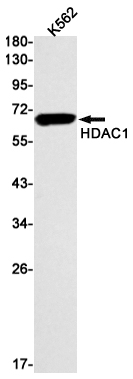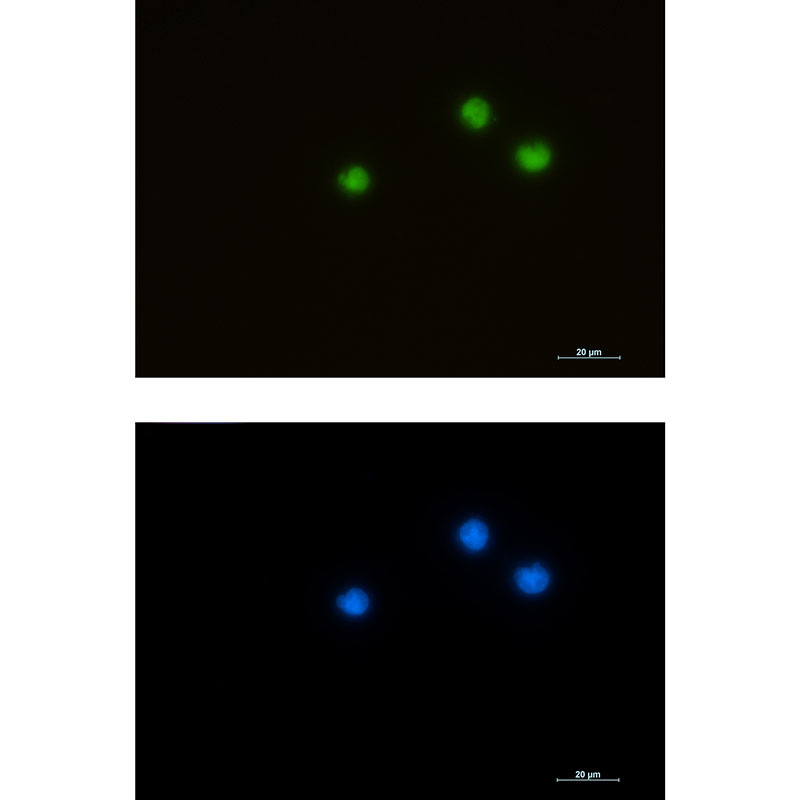

| WB | 1/500-1/1000 | Human,Mouse,Rat |
| IF | 咨询技术 | Human,Mouse,Rat |
| IHC | 咨询技术 | Human,Mouse,Rat |
| ICC | 1/50-1/200 | Human,Mouse,Rat |
| FCM | 咨询技术 | Human,Mouse,Rat |
| Elisa | 咨询技术 | Human,Mouse,Rat |
| Aliases | HDAC1; RPD3L1; Histone deacetylase 1; HD1 |
| Entrez GeneID | 3065 |
| WB Predicted band size | Calculated MW: 55 kDa; Observed MW: 62 kDa |
| Host/Isotype | Rabbit IgG |
| Antibody Type | Primary antibody |
| Storage | Store at 4°C short term. Aliquot and store at -20°C long term. Avoid freeze/thaw cycles. |
| Species Reactivity | Human,Mouse,Rat |
| Immunogen | A synthetic peptide of human HDAC1 |
| Formulation | Purified antibody in TBS with 0.05% sodium azide,0.05%BSA and 50% glycerol. |
+ +
以下是3-4条关于HDAC1抗体的参考文献及其简要摘要:
---
1. **"Histone deacetylase 1 (HDAC1) is required for cell cycle progression and transcriptional regulation in *Saccharomyces cerevisiae*"**
- **作者**: Taunton, J. et al. (1996)
- **摘要**: 该研究首次纯化并克隆了HDAC1.利用特异性抗体证实了HDAC1在酵母细胞周期调控中的作用,揭示了其通过组蛋白去乙酰化影响染色质结构和基因沉默的机制。
---
2. **"Genome-wide mapping of HDAC1 in human cells reveals its role in chromatin remodeling and transcriptional repression"**
- **作者**: Zhang, Y. et al. (2005)
- **摘要**: 通过染色质免疫沉淀(ChIP)结合HDAC1抗体,研究揭示了HDAC1在全基因组范围内与基因启动子区域的结合模式,表明其通过招募Sin3/CoREST复合物抑制靶基因转录,尤其在癌症相关通路中起关键作用。
---
3. **"Overexpression of HDAC1 in colorectal cancer: A potential biomarker for prognosis and therapeutic target"**
- **作者**: Senadhi, A. et al. (2011)
- **摘要**: 利用HDAC1抗体进行免疫组化分析,发现结肠癌组织中HDAC1蛋白表达显著上调,且与患者不良预后相关,提示其可作为癌症诊断标志物及表观遗传治疗靶点。
---
4. **"HDAC1 regulates neuronal differentiation by suppressing the Notch signaling pathway"**
- **作者**: Montgomery, R.L. et al. (2009)
- **摘要**: 通过Western blot和免疫荧光技术结合HDAC1抗体,研究证明HDAC1通过抑制Notch通路调控神经元分化,为神经发育障碍的机制提供了新见解。
---
这些文献涵盖了HDAC1在基础生物学、基因组调控、癌症及神经科学中的研究,均明确使用了HDAC1抗体作为关键实验工具。
Histone deacetylase 1 (HDAC1) is a key enzyme involved in epigenetic regulation, belonging to the class I HDAC family. It catalyzes the removal of acetyl groups from lysine residues on histone proteins, promoting chromatin condensation and transcriptional repression. HDAC1 interacts with multiprotein complexes like Sin3. NuRD, and CoREST to regulate gene expression by modifying chromatin structure. It plays critical roles in cell cycle progression, differentiation, and DNA repair, and its dysregulation is linked to cancers, neurodegenerative diseases, and inflammatory disorders.
HDAC1 antibodies are essential tools for studying its expression, localization, and function in biological processes. They are widely used in techniques such as Western blotting, immunohistochemistry (IHC), immunoprecipitation (IP), and chromatin immunoprecipitation (ChIP) to investigate HDAC1-protein interactions, histone modification patterns, and gene regulation mechanisms. Researchers also utilize these antibodies to explore HDAC1's involvement in disease pathways and to evaluate the efficacy of HDAC inhibitors in preclinical models. Specificity validation via knockout controls is crucial, as cross-reactivity with other HDAC isoforms (e.g., HDAC2/3) may occur. HDAC1-targeting research remains central to advancing epigenetic therapies and understanding cellular plasticity.
×